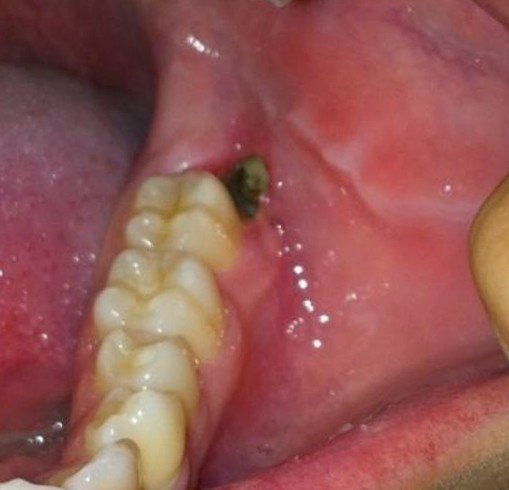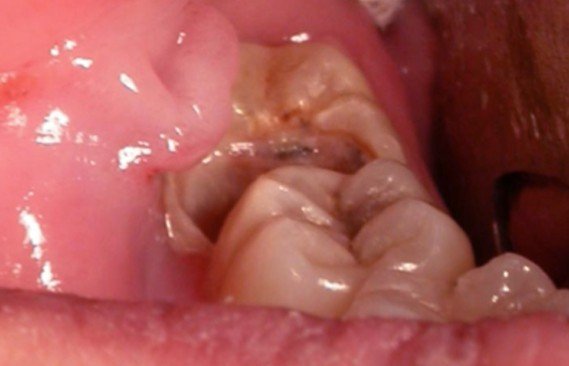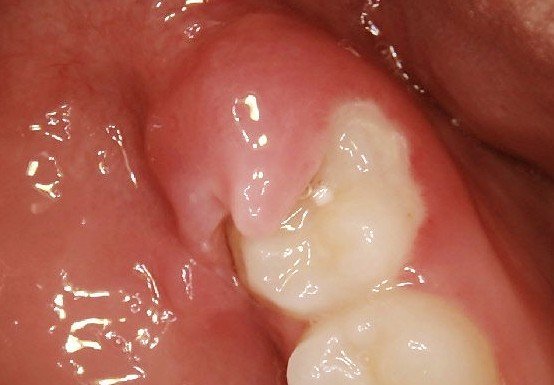Wisdom Tooth Infection
Last reviewed by Dr. Raj MD on January 12th, 2022.
What is Wisdom Tooth Infection?
Pericoronitis is the medical term used to describe a wisdom tooth infection or infection of the surrounding tissue near the third molar. The infection usually occurs when the third molar or the wisdom tooth partially break through the gum. The partial eruption of the wisdom tooth normally occurs when there is no enough space at the back of the jaw to accommodate the erupting third molar.
Infection of the wisdom tooth is an extremely painful experience that can result to a feeling of general unwellness and total discomfort. Wisdom tooth is potential for infection due to their location within the oral cavity which is very hard to reach to render hygiene causing buildup or accumulation of food particles and other debris that later on provide a place for the bacteria to flourish.
The third molar or the wisdom tooth is the last set of teeth that usually comes out during early adolescence or by the time an individual reaches late teens to mid 20s of age. Infection of the wisdom tooth is therefore common in young adults as this set of teeth usually comes out around this age. It is less likely for Pericoronitis to occur by the time an individual reaches the age of beyond 20 to 25 years.
Although not a life-threatening condition, wisdom tooth infection still requires medical attention and should be given enough attention. The danger of the condition is the potential of the infection to reach the bloodstream or develop into septicemia which is potentially life-threatening particularly in people with neutropenia.
Whether to remove or not the wisdom tooth has always been an issue particularly if it causes a lot of discomfort yet there are individuals who do not suffer from the discomfort and complications of wisdom tooth even when it has not erupted fully into the gums. The infection however can result in a lot of pain and discomfort which can affect the quality of life.
Symptoms
The onset of wisdom tooth infection can either be acute or chronic. The symptoms can be varied and with varying degree as well. The symptoms of an infected wisdom tooth usually differ from one patient to another depending on the cause and degree of infection.
- Pain is the most common symptom of an infected wisdom tooth. The pain can be an awful lot and usually gets worse as the infection progresses
- The pain can be throbbing and which may radiate to adjacent areas such as in the ear, throat and the temporomandibular joint including the floor of the mouth
- Erythema and swelling of the gum tissue surrounding the infected wisdom tooth usually occur and often causes pain when the swelling is applied with pressure
- A foul odor of breath may also occur due to the accumulation of bacteria that releases a volatile sulfur compound that emit bad odor
- A change in taste which is usually a bad taste in the mouth may also be experienced due to the pus exudates
- Ulceration of the operculum may also be seen
- Pus formation within the gumline of the infected wisdom tooth
- Swelling of the cheek of the affected area
- Difficulty in swallowing food
- Difficulty in chewing or masticating food often due to perception of pain
- Loss of interest in food
- Some patients experience fever
- General feeling of being unwell
- Headache may also occur
- Some patients may also experience difficulty in opening their mouths often as a result of infection within the muscle of mastication
- A palpable lymph nodes that have enlarged is usually felt under the jaw
Causes
Infection of the wisdom tooth often occurs as a result of impaction or partial eruption of the wisdom tooth. The third molar or the wisdom tooth is the last set of teeth that erupts in the back of the jaw where gum space is not enough to accommodate the erupting tooth. When no enough space is provided, the wisdom tooth can grow sideways, gets trapped between the gums and the bone or may partially erupt or break through the gumline. The manner of growth of wisdom tooth can have food particles and other debris trapped within the structure of the wisdom tooth. The buildup of food particles and other debris will later develop to plaques which can then cause the infection.
The location of the wisdom tooth at the back of the jaw makes it hard to reach by toothbrush therefore giving it not enough cleaning. Improper oral hygiene or tooth brushing is tantamount to plaque buildup resulting in tooth decay potential for bacteria to flourish.
An impacted wisdom tooth whether hard impaction or soft impaction can result to misalignment of the adjacent teeth or may result to other dental problems. The misaligned teeth can provide a space for food particles and other debris to get trapped between the teeth and the gums which then leads to the proliferation of bacteria and later infection.
Treatment
The wisdom tooth infection can be treated in various ways either through conservative approach or through surgical removal. The treatment approach depends on the cause of the infection and its severity. The problem however lies with the gum flap which should be given a special attention in ensuring that no food particles or other debris can get trapped into it. The gum flap can only get resolved when the wisdom tooth totally emerges or when the wisdom tooth is removed.
An infection limited only to the wisdom is usually treated with warm salt water. The patient is usually asked to gargle or rinse with warm salt water after brushing and flossing the teeth. Rinsing with warm salt water is recommended for several times a day.
Ibuprofen and acetaminophen are often prescribed or may be bought over-the-counter to help in alleviating the symptom of pain. The symptom of pain however tends to recur unless the source of pain is properly treated or removed.
Antibiotics are often prescribed to infected wisdom tooth particularly if the infection has reached the nearby areas. Penicillin is the usual therapy prescribed for the treatment of infection although there are patients that get an allergic reaction to the medication.
Surgical removal or tooth extraction is the recommended treatment for severe and recurring inflammation. A wisdom tooth that is impacted and has become infected is usually recommended for extraction.
A proper oral hygiene should be best observed to prevent plaque buildup that is potential for bacterial proliferation and other dental problems.


